
The Slow Rescue of the Opera-less Opera House of Thomas, WV
feature image courtesy Alpine Heritage Preservation
Imagine you are an enterprising settler in the highest and wildest part of the WV wilderness in the early 1890s. The booming coal and timber industries in West Virginia have avoided these highlands in favor of warmer, friendlier conditions in other parts of the state, but they are finally bracing themselves to harvest the riches that nestle on the weather-beaten mountaintops in Tucker County. It is 1892 and the town of Thomas is freshly incorporated. What does this community need? Why, an opera house, of course.
 Not two years after municipal incorporation, the City Opera House opened its doors and enjoyed a brief seven years of being the cultural center of the young community. After the wooden Opera House, along with over 80 other buildings along Thomas’ booming Front Street were destroyed in a devastating fire in 1901, Hiram Cottrill, a former mine superintendent who had learned his lesson, rebuilt the Opera House — but this time out of brick.
Not two years after municipal incorporation, the City Opera House opened its doors and enjoyed a brief seven years of being the cultural center of the young community. After the wooden Opera House, along with over 80 other buildings along Thomas’ booming Front Street were destroyed in a devastating fire in 1901, Hiram Cottrill, a former mine superintendent who had learned his lesson, rebuilt the Opera House — but this time out of brick.
That building which still graces Front Street today was designed by Homboe & R.C. Lafferty, an architectural firm out of Clarksburg. It opened to the public in 1902. The “opera house” moniker was a bit of a cover-up for the popular vaudeville acts that occupied the stage most of the time. These shows, fueled and funded by Cottrill’s saloon on the first floor, could be “raucous and profane, and women and children were barred from attending the most unseemly performances.”(1) But the building also hosted concerts, recitals, theater productions, and events like dances, weddings, and political events.
With the advent of Prohibition and the shuttering of the saloon, the venue could not survive on ticket sales alone and was forced to shift gears. Cottrill sold the building and throughout the middle of the 20th century the building was known as the Sutton Theater. The theater showed movies and newsreels to residents and visitors from neighboring communities. As the once-thriving community of Thomas slid into a period of decline, so too did the Opera House and in 1977 the doors closed permanently as the building started succumbing to the inevitable process of deterioration.
 The steps to rescuing and rebuilding a historic building are many and complex. Many community members continue to have strong and deep connections to the building, while the rapidly crumbling structure demands immediate and decisive action despite funding challenges. The Alpine Heritage Preservation (AHP) formed in 1981 to rescue and restore Cottrill’s Opera House and has spent the past 40 years stabilizing the building structure, roof, and floors. When the group re-organized again in 2018 with new board energy, they asked Woodlands to facilitate their Strategic Planning process. One of the first steps was to develop a market study and business plan to guide the reconstruction phase of their project. The market study determined that the building would be able to best support itself by returning to its roots and providing a wide range of services and entertainment to the community. They plan to provide music concerts, movies and theater, community events, and rentals with associated businesses on the ground floor. Sound familiar?
The steps to rescuing and rebuilding a historic building are many and complex. Many community members continue to have strong and deep connections to the building, while the rapidly crumbling structure demands immediate and decisive action despite funding challenges. The Alpine Heritage Preservation (AHP) formed in 1981 to rescue and restore Cottrill’s Opera House and has spent the past 40 years stabilizing the building structure, roof, and floors. When the group re-organized again in 2018 with new board energy, they asked Woodlands to facilitate their Strategic Planning process. One of the first steps was to develop a market study and business plan to guide the reconstruction phase of their project. The market study determined that the building would be able to best support itself by returning to its roots and providing a wide range of services and entertainment to the community. They plan to provide music concerts, movies and theater, community events, and rentals with associated businesses on the ground floor. Sound familiar?
Now armed with studies, data, conceptual renderings, and a long line of citizens who care a whole awful lot, AHP is making a big push to finish the rehab. Woodlands Development & Lending’s Emily Wilson-Hauger has helped the organization line up a significant amount of grants and donations to work on the building’s façade, make a development plan, and initiate a capital campaign to finally bring this long-awaited project to fruition. As the Thomas community is once again booming, the Opera House has a real shot at rising from the ashes once more, this time as a beloved icon from years past that will serve a thriving community racing towards an exciting future.
References: (1) CottrillsOperaHouse.org — AHP’s web portal for the rehabilitation project

How To Make a Big Impact with Small Lending
Carla and Jason Kaposy felt compelled to make an investment that could be pivotal in spurring economic development in their hometown of Petersburg, a Mon Forest Town in Grant ...
Read More
A Golden Rule Ghost Story
all words and photos by JoLynn Powers, reprinted with permission JoLynn Powers served as an Americorps with Woodlands during the early stages of reconstruction work on the Golden Rule ...
Read More
Financing Community Vibrancy
In the heart of Elkins, West Virginia, an inspiring transformation is taking place. Woodlands Development Group, is revitalizing neighborhoods by building new single-family homes on lots that were once ...
Read More